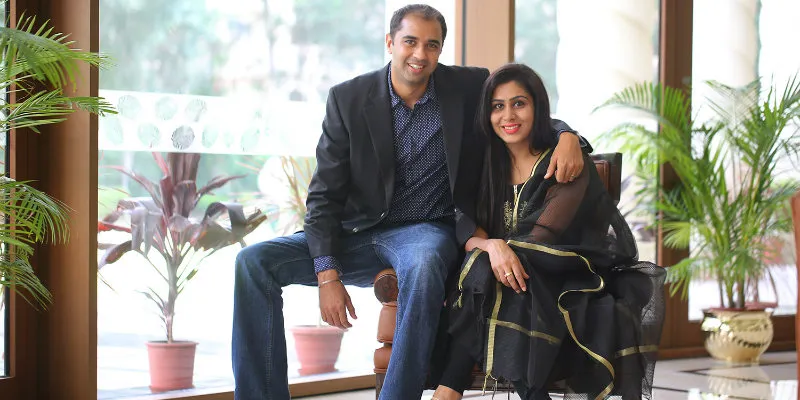How this baby product startup positions itself to compete against FMCG giants — Johnson & Johnson, Wipro, Dabur
In February 2016, a Missouri state jury ordered Johnson & Johnson to pay $72 million in damages to the family of a woman whose death from ovarian cancer was linked to her decades of use of the company's talc-based Baby Powder and Shower to Shower.

The news sent jitters across the world about the safety of such baby products.
Two years ago, when Varun and Ghazal Alagh became parents, during their research on the quality of baby products, they came across the fact of the presence of toxins such as parabens, SLS, mineral oil, and others in almost all the baby products.
Varun and Ghazal call themselves “Google parents” as every product they buy for their child — from feeding bottles to shampoos to other products — is through a thorough research.
They found that no Indian brands provides 100 percent toxin-free guarantee baby products and so, they had to order products from the US and the UK at steep costs.
When they surveyed new parents, they realised that many parents were concerned about the same fact. These parents have either stopped using any kind of products on their babies or they import safe-marked baby products from other parts of the world.
Their continuous interaction with the people made them realise the baby products category need a final solution as there’s a huge demand for safe and secured products.
During mid-2016, the husband-wife duo founded Honasa Consumer Pvt. Ltd, a Delhi-based company that aims to provide natural and toxin-free personal care products for infants, kids, and young mothers. And by the end of 2016, the company unveiled its first brand called MamaEarth, which claims to provide a huge range of safe, toxin-free international standard products.
“We are certified by Made Safe, a US-based non-profit organisation that provides a comprehensive human health-focused certification for non-toxic products. All the products are clinically tested to be hypoallergenic and carries no toxins, dyes, artificial fragrances or anything which is even close to the word ‘unsafe’,” says 32-year-old Varun, Founder and CEO of MamaEarth. Varun, an engineering graduate from Delhi College of Engineering (DCE) and an XLRI alumnus, has over 10 years of experience in FMCG segment.
He adds that all products go through multiple testing processes. A microbiology test is first carried out to ensure there are no microbes formed. Each batch is then tested for key toxins to ensure the products are free from toxins. These products are tested for stability basis BIS standards in extreme conditions to ensure they maintain consistency and character. Then they are sent to Europe for clinical dermatology testing on humans.
The launch
Varun believes that launching non-toxic baby products was a unique and noble idea, which he claims no other product manufacturers are doing in India. The investors were convinced about the prospects of such products in the Indian market.
In 2016, the company raised a pre-seed round of $125,000 from the consortium of investors. The raised funds were used for inventory, research and development, and marketing.
Last year, the brand MamaEarth was launched at Amazon Launchpad, a platform for startups to feature their products, and FirstCry. It soon plans to expand to other online channels depending on relevance.
Market target
The Indian maternity and baby care products market has been witnessing tremendous growth in the last few years in comparison to the other emerging markets across the world.
According to the statistics collected by ResearchMoz, the baby care market in India will progressively grow at a 17 percent CAGR within the time frame from 2014-2019.
“We currently have seven products in the baby care segment. We plan to launch our pre-natal and post-natal care range in 2017. We are also working on categories like feeding equipment and soft clothing for 2018. Our ambition is to take one percent of this market over the next five years through share gain and category expansion,” says Varun.
Stiff competition
There are many brands which are competing to cater to the baby product category in India. Of many brands, Johnson & Johnson holds the largest market share.
In 2015, Johnson & Johnson (India) continued to lead sales, recording a value share of 75 percent. The next in the competition list was Dabur India (10 percent) followed by Himalaya Drug Co (three percent), and Wipro (two percent).
When asked about fighting the existing giants in this category, Varun quips, “We believe we have superior and safer products than anyone else in the market.”
He adds that he plans to educate the consumer about toxins as well as about the benefits of using natural ingredients present in his products. His customer acquisition strategy is purely focussed on digital content. He wants consumers to read about the problems that his products solve and why his product is the best in the market.







